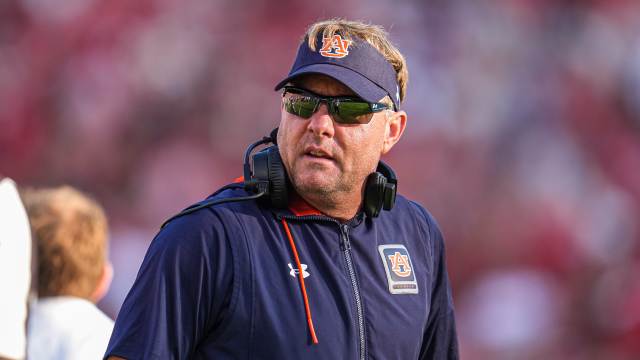The Hugh Freeze Effect: Rebuilding With Vision
Head Coach Hugh Freeze’s impact on Auburn football has been swift and deliberate. Inheriting a program that had struggled to find consistency, Freeze has approached rebuilding with a blend of old-school fundamentals and modern roster-building techniques, namely aggressive transfer portal recruitment. His ability to adapt to the rapidly changing landscape of college football—especially with NIL and player mobility—has played a pivotal role in Auburn’s meteoric rise in national projections.
Freeze has emphasized culture, accountability, and competition in practice. “We’re not just acquiring talent—we’re building a team,” Freeze said during a spring media availability. “Every player we bring in must fit the program’s values, not just our depth chart.”
His approach has turned Auburn into a preferred destination for elite players looking to contend immediately while receiving NFL-level development.
Offensive Overhaul: From Weakness to Weapon
Few units in the SEC were more maligned than Auburn’s receiving corps over the past two decades. Entering 2025, the Tigers boast arguably the best wide receiver group in the conference—and one of the top units nationally. Eric Singleton Jr. brings elite speed, route-running, and SEC-ready toughness. Alongside Singleton are blue-chip underclassmen like Cam Coleman and Perry Thompson, both of whom turned heads during spring practices with their catch radius and explosiveness.
Also worth noting is tight end Rivaldo Fairweather, a versatile pass-catcher who returns as a senior and provides a valuable red zone target. With this cast, Auburn can now run multiple offensive sets, stretch the field horizontally and vertically, and keep defenses guessing.
Offensive Coordinator Philip Montgomery has hinted at a “much faster tempo” and a “player-led scheme” designed to unleash the full potential of the skill-position talent. The era of predictable play-calling and stagnant drives seems firmly in the rearview mirror.
Quarterback Situation: A Good Problem to Have
For the first time in recent memory, Auburn’s quarterback room is filled with both talent and experience. Jackson Arnold, the former Oklahoma signal-caller, brings poise and pocket awareness. While he’s the favorite to start Week 1, freshman phenom Deuce Knight is already generating buzz on the Plains.
The real story might be how Auburn utilizes both quarterbacks across the season. Freeze’s past success with dual-QB systems—dating back to his time at Ole Miss—suggests that Auburn might use Knight situationally to maximize his unique blend of arm strength and mobility. The coaching staff is adamant that the QB room is a meritocracy, and practices this summer will be crucial in determining the depth chart.
This dynamic raises Auburn’s offensive ceiling significantly and gives them the ability to adjust on the fly against elite SEC defenses.
Offensive Line: Quietly Dominant
Often overlooked, Auburn’s offensive line has seen a quiet transformation. With the addition of Virginia Tech transfer Xavier Chaplin and the emergence of underclassmen like Connor Lew and Gunner Britton, Auburn now has a line capable of creating clean pockets and opening lanes in the run game.
This improvement up front has ripple effects—better protection for Arnold or Knight, more time for route development, and increased playbook flexibility. Auburn will likely run more play-action and bootlegs, which Freeze favors in high-leverage downs.
Offensive line coach Jake Thornton deserves major credit for development and recruiting. Auburn has also emphasized strength and conditioning under new director of performance Brent Hill, who introduced NFL-caliber programs for in-season stamina and recovery.
Defensive Outlook: Underrated and Eager
While most of the buzz centers around the Tigers’ offense, the defense is quietly assembling into one of the most complete units in the SEC. Anchored by returning stars like linebacker Eugene Asante and edge rusher Keldric Faulk, Auburn’s defense is fast, physical, and relentless.
The secondary was a concern in 2024, but the addition of cornerback Raion Strader (via the portal from Miami of Ohio) and the development of Kayin Lee have added speed and instinct. Auburn’s defensive scheme under DC Ron Roberts leans heavily on simulated pressures, disguising coverage shells and disrupting quarterback timing.
If the defensive line can generate consistent pressure, Auburn could finish top-three in the SEC in total defense. That would be a perfect complement to an explosive offense.
NIL Impact and Fan Buy-In
Behind the scenes, Auburn’s success in both recruiting and retention has been significantly aided by the school’s well-structured NIL infrastructure. The On To Victory collective has emerged as one of the most organized and well-funded in the SEC, enabling Auburn to both attract and retain premier talent.
This has coincided with a surge in fan enthusiasm. Season ticket renewals are at a five-year high, and merchandise sales have skyrocketed following the Singleton transfer. Auburn’s commitment to excellence is now reflected not only in its facilities but in its national perception.
Auburn’s social media team has also played a major role in reshaping the narrative. From viral recruiting graphics to behind-the-scenes player interviews, the program is finally embracing the spotlight—and thriving in it.
National Recognition and Expectations
Following Singleton’s commitment, Auburn catapulted into the Top 10 of multiple preseason rankings. Analysts on ESPN, CBS, and 247Sports have all predicted that the Tigers will be a dark horse contender for the College Football Playoff, especially with Alabama and LSU retooling.
The SEC West remains brutal, but Auburn’s trajectory is different now. No longer are they seen as a “developmental” team that might pull off an upset; they are now a legitimate weekly threat. Eric Singleton Jr. is viewed as a Biletnikoff Award candidate, and Hugh Freeze is an early name in Coach of the Year watch lists.
If Auburn can navigate a tough early-season stretch (including games against Georgia and Texas A&M), a playoff push is not only possible—it’s plausible.
Auburn’s Path to the College Football Playoff
For Auburn to reach the College Football Playoff, the formula is clear:
- Win Key SEC Matchups: Defeating LSU, Alabama, or Georgia would significantly boost their resume. Two out of three likely guarantees a playoff berth.
- Maximize Eric Singleton Jr.’s Production: Target him early and often. If he’s healthy and producing, the entire offense opens up.
- Establish QB Stability: Whether Arnold, Knight, or a combination leads the way, QB play must be consistent—particularly in late-game scenarios.
- Stay Healthy: Depth has improved, but Auburn’s top-end talent needs to remain on the field to realize their potential.
Auburn Is Back
The narrative has shifted. No longer is Auburn merely a program with tradition—it’s now a team with talent, structure, coaching, and belief. Landing the No. 1 transfer in the country was the moment Auburn signaled that it was no longer rebuilding—it was ready to compete.
The 2025 season is shaping up to be the most anticipated campaign on the Plains in over a decade. For the fans, the players, and the coaching staff, the message is clear: Auburn isn’t just back—they’re coming for it all.



